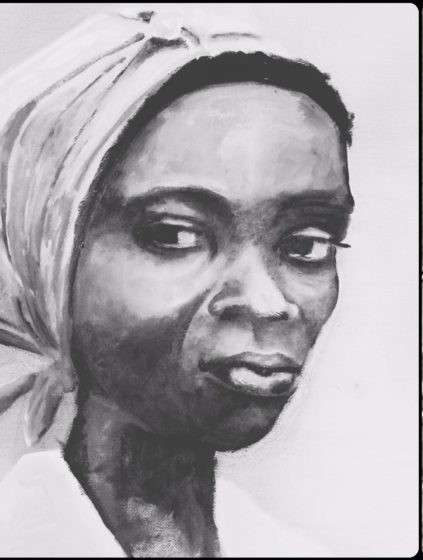Breffu was an Akwamu leader of the 1733 slave insurrection on St. John (then known as St. Jan) in Danish West Indies. She committed suicide with 23 other rebels to evade capture as the rebellion weakened in 1734.
Breffu (possibly derived from Twi, Baffour) was an Akwamu leader of the 1733 slave insurrection on St. John (then known as St. Jan) in Danish West Indies. She killed herself with 23 other rebels to evade capture as the rebellion weakened in 1734.[1]
Breffu | |
|---|---|
| Other name(s) | Baeffu, Beafuu, Beffru |
| Nickname(s) | Queen of St John |
| Born | Akwamu, Ghana |
| Died | April/May 1734 St. Jan, Danish West Indies |
| Allegiance | Akwamu Insurrection |
St Jan Slave Insurrection
Breffu was enslaved at a plantation owned by Pieter Krøyer and lived in Coral Bay.[2] On 23 November 1733, hearing the signal of a cannon fired from Fort Fredericksvaern, Breffu entered the main house and killed both Krøyer and his wife. Taking all gunpowder and ammunition, and accompanied by fellow slave Christian, Breffu then proceeded to the Van Stell family house, where she killed three members of the plantation owner's family.[3]
Some slave masters were able to get off the island on boats and the Akwamu people gained control of most of the territory. Under the leadership of Breffu, the plan of taking over the plantations was successful until the early part of 1734, when the French collaborated with the Danes to take back the island.[4]
She killed herself to evade capture[5] in either April or May 1734.[2] Her body was discovered at Browns Bay, along with another 23 rebels who killed themselves alongside her, at which a plantation owner recorded his surprise that, "one of the leaders of the rebellion, Baeffu, whom none of us knew, and whom we assumed to be a man having murdered my son Pieter Krøyer and his wife, is a woman!"[6]
In popular culture
Breffu has been dramatised as the "Queen of St John" in the play Three Queens Chautauqua Series: Act I Queen Breffu.[7] In a 2006 production, Breffu was portrayed by the academic Jaweh David.[7] She has also featured as a subject in festival floats at St John celebrations.[8]
References
- ^ "The story of Breffu, a female slave from Ghana who led a massive slave revolt to take over the West Indies in 1733". Ghanaian Museum. 2019-12-23. Archived from the original on 2023-04-02. Retrieved 2020-02-07.
- ^ a b Norton (2013), p. 300.
- ^ Norton (2013), p. 69.
- ^ "The story of Breffu, a female slave from Ghana who led a massive slave revolt to take over the West Indies in 1733". Face2Face Africa. 2018-09-03. Retrieved 2019-09-17.
- ^ Holly Norton (20 March 2018). "Breffu: a slave, a rebel, a fighter – and a woman almost invisible to history". The Guardian. Retrieved 31 March 2018.
- ^ Norton (2013), p. 90.
- ^ a b St. John Tradewinds (19 June 2006). "Three Local Queens Embodied in Chautauqua Series". St. John Tradewinds. Retrieved 31 March 2018.
- ^ Andrea Milam (5 July 2014). "New Troupes Dance Through Cruz Bay Alongside Old Favorites at 60th Anniversary Festival Parade". St. John Tradewinds. Retrieved 31 March 2018.
Works cited
- Norton, Holly Kathryn (2013). Estate by Estate: The Landscape of the 1733 St. Jan Slave Rebellion (PhD). Syracuse University. ProQuest 1369397993.

